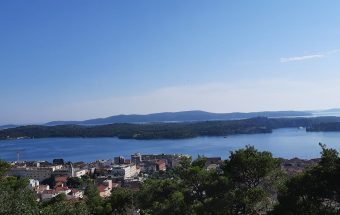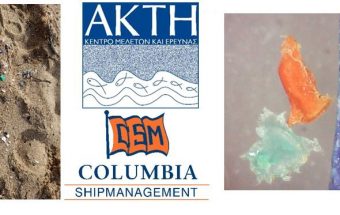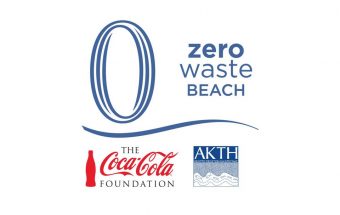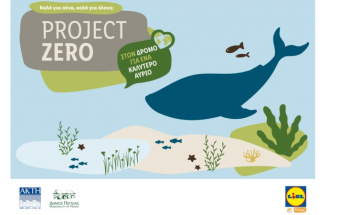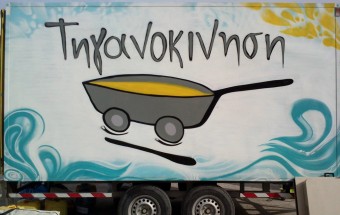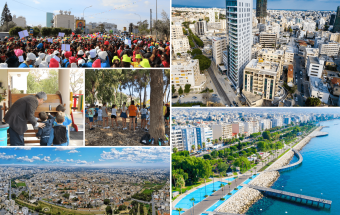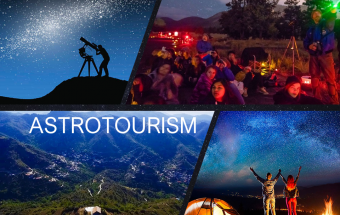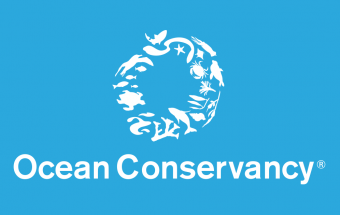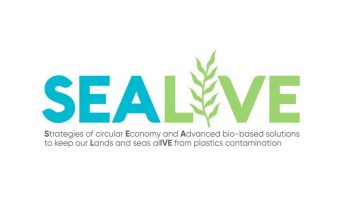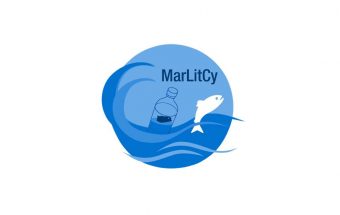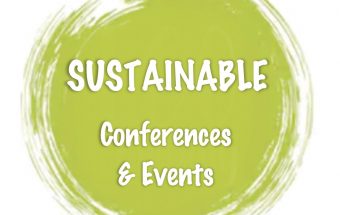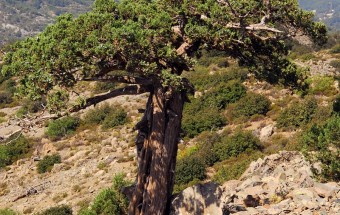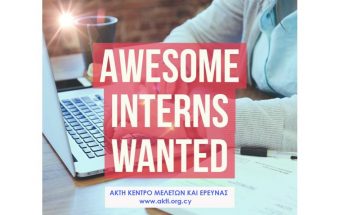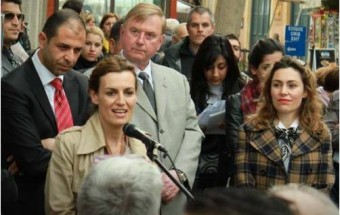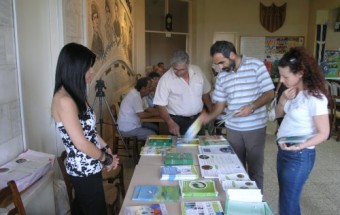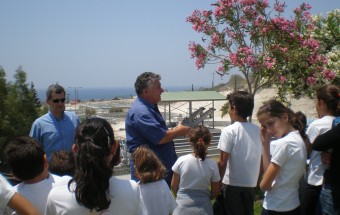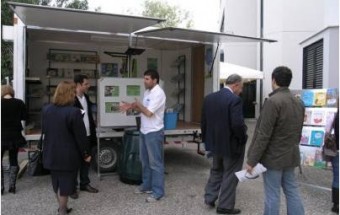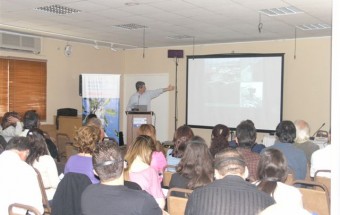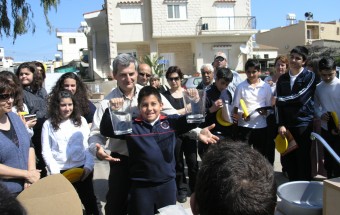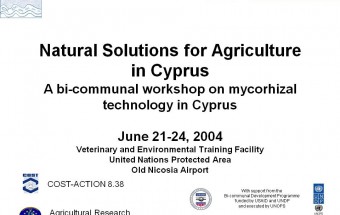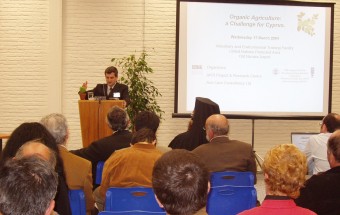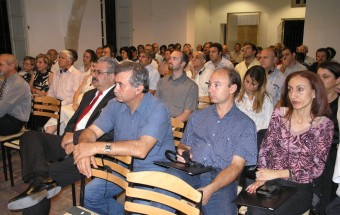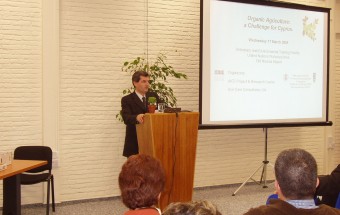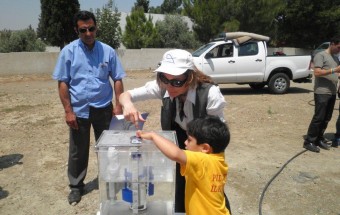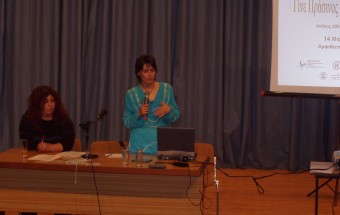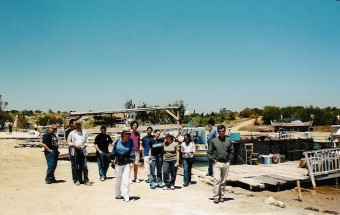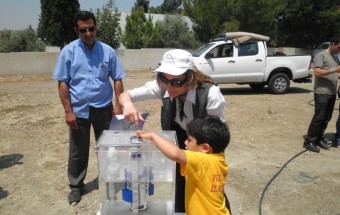Applied Environmental Research
AKTI implements environmental research based on the Cyprus’s context, scale and particularities aiming to provide answers and tangible solutions to the island’s environmental challenges. It also transfers good practices that are applied abroad and pilot tests while adjusting them to the Cyprus needs.
SeaTecHub: Croatia-Cyprus Excellence Hub on Eco-Innovative Technologies for Healthy and Productive Seas
The main goal of the SeaTecHub project is to strengthen Croatian and Cyprus place-based innovation ecosystems and improve access to excellence for R&I actors by cross-border collaboration on a common strategy and alongside value adding chains within the area of eco-innovative technologies for healthy and productive seas, focusing on the sectors of Aquaculture and fisheries, Smart ports, Maritime security and protection, Research and Education, and Maritime technologies, which are aligned with Croatian and Cypriot Smart Specialization Strategies and have been identified as emerging and established sectors in the EU Blue Economy Report 2021.
The objectives of the SeaTecHub project are
1)to facilitate long-term cross border and inter-sectoral collaboration to advance eco-innovative technologies for healthy and productive seas,
2) to perform joint research work to close knowledge gaps, consolidate and reinforce quadruple-helix linkages, and validate strategy and action and investment plans (AIPs),
3) to implement a set of mutual learning and skills development measures, and
4) to raise visibility of Croatian-Cyprus innovation ecosystems by implementing strategic measures in the form of organizing networking, knowledge and experience transfer events.
The SeaTecHub consortium covers the quadruple helix of Croatian and Cyprus ecosystems, including 2 research organizations, 4 public authorities, 5 business actors, 3 NGOs and 49 institutions who expressed their strong willingness to participate and collaborate for the successful implementation of the project activities.
SeaTecHub is a Horizon Europe project implemented through funding by the European Commission under the Horizon Widera Programme Framework.
Microplastics: Detection on Cyprus beaches sampling and analysis
Microplastics are found everywhere, in the food we eat, the water we drink and according to the latest scientific research, are present even in human lungs. As a result, efforts to minimize their negative effect on the environment and our health are being intensified.
AKTI implements this research project, which is the first of its kind in Cyprus and aims to highlight the detrimental effects of microplastics on the marine environment. It includes sampling at 10 beaches in Cyprus – five popular and five remote during both the summer and winter months and laboratory analysis will be done at the Department of Civil Engineering lab of the University of Cyprus.
With 2022 as the base-line year, these first results will identify the four most microplastic-polluted beaches. These locations will then receive more detailed monitoring, sampling and analysis on the abundancy, and type, of microplastics. The research project will create the first data series of systematic microplastics monitoring in Cyprus.
This field work will provide valuable data to guide the policies against plastic pollution, since it will give the first indication in the eastern Mediterranean of microplastics concentration on beaches. AKTI plans to engage interns, university science students, citizens and volunteers to help with the project.
This project is supported by Columbia Shipmanagement.
Zero Waste Beach in Cyprus. Zero Waste Future in Malta. Net Zero in Cyprus and Malta
Zero Waste Beach and Future projects
Marine litter is an environmental, economic as well as human health problem with no simple solution. It poses a global, complex and multi-dimensional challenge with significant implications for the marine and coastal environment and human activities all over the world. Recovery and recycling of the most common marine litter items, are important steps in halting the inflow of items into the marine environment and are also critical first steps in promoting the Circular Economy. Recovery and recycling are particularly critical in island countries, such as Cyprus and Malta.
To address the problems outlined above, the initiative proposed here aims to engage citizens, students, local authorities and businesses to take ownership of the environment they spend most time in so as to increase recycling and decrease land and marine litter, using the “producer responsibility” mentality, but through soft, awareness-raising and participatory measures.
Activities for Zero Waste Beach Cyprus:
Click here to learn about some exciting news for Cyprus!
🎥 General Actions_Total Results (video_en)
🎥 General Actions_Total Results (video_gr)
📈Infographic_Total Results (2018-2020) (pdf_gr)
1️⃣. Strengthened and expanded the «Responsible Coastal Businesses Network»: to 310 members, through the implementation of an extensive awareness-raising campaign, targeting all coastal businesses on the island. In these campaigns, AKTI’s staff have been liaised with approximately 800 business owners/managers/employees, informing them about marine litter (sources and impacts) as well as about the upcoming European legislation on single-use plastics and how it affects them and assisting them in implementing practices that will minimize their plastic production and thus minimize the potential for marine plastic pollution from their operations and their customers’ activities. The involvement of local authority representatives has added particular clout to this activity.
❓ HOW and WHY to join the Responsible Coastal Businesses Network_EN_(pdf)
❓ HOW and WHY to join the Responsible Coastal Businesses Network_GR_(pdf)
The RCB network members can be viewed in the below map.
To provide inspiration, a Decalogue and a Guide were developed during the last year implementation of the project and distributed to the Coastal Businesses. Decalogue contained 10 basic possible good practices and the Guide contained examples of these good practices in order to inspire the applicants and encourage them to act against plastic pollution and generally for a more green performance of their businesses.
An electronic version of these, are available here:
✅ Examples of Good Practices_gr
2️⃣. Tracked and recorded recycling waste from the Responsible Coastal Businesses: The members of the Responsible Coastal Businesses Network ought, as a mandatory term of their network membership, to record the amount of recyclable waste (PMD, glass, general) that they dispose. 980 tons of recycling waste collected by the responsible coastal businesses throughout the duration of the project. This has been monitored with regular visits by AKTI’s group of experts, who also provided their suggestions on how the business can become more effective in recycling. In this way, they will be able to set goals and monitor their reduction in the long run, as a result of the implementation of plastic reducing practices.
3️⃣. Beach cleanups in conjunction with the International Coastal Cleanup: AKTI implemented annual beach cleanups on selected beaches with the collaboration of the Responsible Coastal Businesses, local authorities, schools, and volunteers.
AKTI is the national coordinator of the International Coastal Cleanup of the Ocean Conservancy in Cyprus. Therefore, all the cleanups implemented using the International Coastal Cleanup Protocol. The data included in the Regional Marine Litter Database and has also be submitted to the ICC.
📸🌊Some photos from the Beach and Seabed Cleanups, are available here: 1 & 2 & 3 & 4 & 5
🎥🌊Some Videos from the Beach and Seabed Cleanups:
video 1___video 2___video 3___video 4___video 5
video 6___video 7___video 8___video 9___video 10
4️⃣. Tracked and recorded recycling waste from the Responsible Coastal Businesses, on-the-go recycle bins and events : 980 tons of recycling waste collected in Cyprus by coastal businesses-members of the Network throughout the duration of the project, of which, the percentage per source of total recyclable waste, were 46% Paper, 30% PMD and 24% Glass. In these 980 tons of recycling waste collected from the coastal businesses, the 130 tons correspond to PET.
This has been monitored with regular visits by AKTI’s group of experts, who also
provided their suggestions on how the business can become more effective in
recycling. In this way, they will be able to set goals and monitor their reduction in the
long run, as a result of the implementation of plastic reducing practices.
17 tons of recyclable waste was collected from these bins during the implementation
period of the project. The aim was to encourage local authorities and communities to
improve collection infrastructure and implement reduction actions for plastics used.
Source identification activity was performed for this action. AKTI’s staff separated
the collected waste per source, to create an innovative database with data that can be
used for directing budget to the management of the most frequent litter.
📸♻️More information and photos about “On-the-go recycling” research action, can be found here.
5️⃣. Α Competition for the implementation of sustainable practices to reduce marine litter, and especially plastics, was launched and implemented. The Competition targeted members of the Responsible Coastal Businesses Network, in an attempt to promote sustainable practices incorporated by coastal businesses in their operation, and to minimize plastic waste entering the coastal and marine environment, thus mitigating/reducing the pollution they cause. Τhe terms for the participation in the Competition and the application form distributed to the Coastal Businesses along with a Decalogue and a good practices Guide, in order to inspire the applicants and encourage them to act against plastic pollution and generally for a more green performance of their businesses. 390 entries/good practices were received. The entries were evaluated by a five-member independent jury: the Chairperson of the Board of Directors of AKTI, Dr. Xenia I. Loizidou, the Media Relations Director at Digital Tree, Mrs Xenia Xenophontos, the Corporate Affairs and Sustainability Manager at Coca-Cola HBC Cyprus, Mrs Melina Limnati and the two members of AKTI, Mrs Anna Tselepou and Ms Maria-Christina Constantinou. The winners were selected by the jury followings a selection process based on 4 criteria: environmental responsibility, social responsibility, innovation and sustainability and the awards are given in two categories, depending on the type – size of the business.
6️⃣. A highly publicised Award Ceremony, “Zero Waste Beach Awards 2023”, was implemented at the end of the project. The winners had the title of «Zero Waste Beach Champions 2023». The ceremony took place in June 22 at Old Powerhouse in Nicosia. The ceremony attended by 72 people, including the General Director of the Ministry of Agriculture, Rural Development and Environment Mr Andreas Georgiou, , the General Director of the Deputy Ministry of Tourism Mr. Antonis Koutsoullis, the Director of Department of the Environment Mrs Elena Stylianopoulou, the president of the Parliamentary Environment Committee MP Mr. Charalambos Theopemptou, the Mayor of Nicosia Mr Constantinos Yiorkatzis, the president of the ‘Cyprus Hotels Association’ Mr E. Loizides, several NGOs, HoReCa representatives, media (TV, radios and newspapers/e-media), Trade Unions, Thirdparty experts, Tour Agents, Environmental Parliamentary Committee and other stakeholders. The Ceremony was extensively covered by local and national media (TVs, radios and newspapers).
The awards are given in two categories, depending on the type of the business (large or small businesses) .The six championships were distinguished in the categories of environmental responsibility, sustainability, innovation and social responsibility.
In the category of large businesses:
🏆 Aliathon Resort received the Sustainability Award
🏆 St. Raphael Resort & Marina received the Innovation Award,
🏆 Capo Bay Hotel received the Social Responsibility Award and,
🏆 Atlantica Aeneas Resort received the Environmental Responsibility Award.
In the category of small businesses:
🏆 Grape by the Sea received the Sustainability Award,
🏆 Klimataria-Beach Bar Resto received the Sustainability Award.
🏆 Avli tis Nefelis received the Innovation Award
🏆Charalambos Holiday Cottage received the Social Responsibility Award.
🏆 Aplostra Beach Bar received the Environmental Responsibility Award.
Special thanks were given to one person to whom the success of Zero Waste beach is owed.
🏅 Anna Tselepou of AKTI
📸Some photos from the Zero Waste Beach Awards, are available for 2019 here. And 2021-2022 here.
🎥Some Videos from the “Zero Waste Beach Awards 2019”:
Video 1___Video 2___Video 3___Video 4
7️⃣. Extensive communication and dissemination activities took place over the duration of the project, and especially at times with important activities, e.g. the project launch, the cleanup events, the competition and the awards ceremony. Communication and dissemination activities were inclusive all means and media (print, online, social etc), and 6,642,737 people reached via AKTI’s social media.
Activities for Zero Waste Future Malta:
Click here to learn about some exciting news for Malta!
1️⃣. Waste characterization: this activity was carried out in the Three Cities of Malta (Cottonera) to identify the main types of waste disposed of and their relative percentages, depending on the type of establishment. This activity provides a solid base of waste data and indicate where efforts must be focused for more effective recycling. The waste characterisation study was carried out by AKTI’s experts, with the strong support of the councils of the Three Cities of Malta/Cottonera. Waste was sampled from at least 66 sampling points,for 3 sampling sessions.The involvement of 3 local authority representatives has added particular value to this activity. More specifically Birgu Municipality, Cospicua and Senglea (The Three Cities of Malta) had Council meetings on the issue and decided to support the implementation of the
Network in all HoReCa establishments within their territory.
🎥Some Videos from “Waste Characterization” action:
📸Some photos from the “Waste Characterization”, are available here.
2️⃣. Build on the “Responsible Coastal Businesses Network in Malta: through extensive awareness-raising campaigns, where representatives of the Coca-Cola Company of Malta, informing business owners/managers about marine litter (sources and impacts) as well as about the upcoming European legislation on single-use plastics and how it affects them, and assisting them in implementing practices that will minimize their plastic production and thus minimize the potential for marine plastic pollution from their operations and their customers’ activities.The Responsible Coastal Businesses Network Ambassadors have liaised with 50 business owners/managers/employees. The below shows the network members inducted until now.
To provide inspiration, a Decalogue and a Guide were developed during the last year implementation of the project and distributed to the Coastal Businesses. Decalogue contained 10 basic possible good practices and the Guide contained examples of these good practices in order to inspire the applicants and encourage them to act against plastic pollution and generally for a more green performance of their businesses.
An electronic version of these, are available here:
✅ Examples of Good Practices_en
3️⃣Tracked and recorded recycling waste from the Responsible Coastal Businesses, on the-go recycling bins, and events: 46.1 tonnes of recycling waste collected from the Responsible Coastal Business Network. Of the 46.1 tonnes of recycling waste collected, 31.4 tonnes were PET, making PET waste 68% of the total recyclable waste collected.
In order to succeed the collection of any possible PMD which is not disposed in the DRS machines, we cooperated with event organizers such as Festivals Malta and Sports Malta in order to install PMD bins during the events. The Zero Waste Future bins were installed in the following events, collecting 17 tonnes of recyclable waste of which 14.5 tonnes were PET:
• Notte Bianca
• Sports Malta Family Day Open Event
• Festivals Malta NYE Event
4️⃣. Beach cleanups in conjunction with the International Coastal Cleanup: annual beach cleanups on selected beaches with the collaboration of NGOs, local authorities, schools, and volunteers. All the cleanups were implemented using the International Coastal Cleanup Protocol in order to be able to identify the sources of the collected litter and to begin compiling data on beach marine litter in Malta. The data were included in the Regional Marine Litter Database and will also submitted to the ICC.
🎥🌊Some Videos from “Beach/Seabed Cleanups and Turtle Release”:
📸🌊Some photos from the Beach and Seabed Cleanups, are available here.
5️⃣. Zero Waste Champions Competition: 24 entries to the Competition.The competition aims at rewarding and recognising those members of the Network who have taken substantial and / or innovative measures to minimise their contribution to the marine litter problem and minimise the use of plastics. Specific criteria and entries were evaluated by an independent jury of experts to announce the ZERO WASTE FUTURE CHAMPIONS! The final event, which is also the Award Ceremony, was completed on the 2nd of June 2023. The event was hosted at Malta Aquarium, one of the Network’s members, and saw the participation of over 200 participants, including school children, representatives of the Ministry of Education, Local Authorities, Members of the Network etc. The welcome speech was presented by the Ministeer of Environment Ms Miriam Dalli. The implementation of the event this year, alongside schools that implement the Eco-Schools’ Litterless Campaign, and hosted by the
Malta Aquarium, Member of our RCB Network. The awards were presented to the following HoReCa who cooperated with the schools to promote the Zero Waste concept through implementation of solutions:
• Talbot & Bons Restaurant
• Talbot & Bons Boutique Hotel
• Costa Coffee
• Manouche
• St. Thomas Moore Tuckshop
• St. Micheals Tuckshop
6️⃣. Extensive communication and dissemination activities took place over the duration of the project, and especially at times with important activities, e.g. , the cleanup events, waste characterization activities etc. 4,600,000 people reached through Communication and dissemination activities were inclusive all means and media (print, online, social etc).
TIGANOKINISI: turning domestic used cooking oil into biodiesel
Turning a harmful waste, such as cooking oil, into biodiesel while promoting development and civic action
Urban Sustainability
Climate Change impacts in Cyprus’ Cities are significant. The need to build urban resilience is imperative, at a bicommunal level, both in south and north. Through a novel, participatory, solution-oriented decision support process, we aim to develop policy tools and a roadmap for implementing solutions. We aim to enhance the awareness of society through participation, developing the feeling of ownership and long-term commitment through the development of the alumni group #TogetherForOurCities. The project is structured around three workshops, 2 mini-workshops one in the south, one in the north followed by a Final Workshop. The major target groups are decision makers and citizens, local Authorities, teenagers/youth, educators and professionals, e.g. urban planners, landscapers, tourism. This activity will initiate the involvement of this wide spectrum of citizens in the effort to build city resilience around the three main pillars: urban green, sustainable mobility, and nature-based solutions. Each workshop will include training/capacity building and a special “smart” session of a participatory and decision support process to identify gaps-needs-suggestions. The experts will be both Turkish and Greek Cypriots. A British expert will be invited for the Final Workshop, where results will be combined, prioritized and will lead to the policy tool and the road map.
The Urban Sustainability Project will run from September 2021 to March 2022, is supported by the British High Commission in Cyprus and is funded as part of the International Programme Fund of the Foreign, Commonwealth and Development Office.
Astrotourism
Astrotourism is a 36-month long project funded by the Research and Innovation Foundation.
The project aims in using a professional approach in astrotourism product research and development for Cyprus along with a high-end astrotourism policy and governance.
Astrotourism’s research objective is to initiate a new section in the Cyprus tourism industry by increasing the number, the quality, the expenditure of the tourists and the number of local jobs in the periphery. Within this objective, we aim to research and create direct and indirect experiences within real, virtual and blended augmented reality environments where the visitor could expand his/her astronomical knowledge in a practical, simple and efficient way. This experience will be an added value tool for Cyprus, where the weather conditions secure clear skies for most of the days and nights. The overall goal is to conduct research that will focus on “beyond the state-of-the-art” innovation in the field of astrotourism leading Cyprus to be added on the world map of the astrotourism “hot” destinations and creating the proper environment to host and offer astronomy experiences for both experts and enthusiasts at an entry level.
Cyprus has one of the clearest night skies as well as optimal geographical location in the world, offering great advantages for astrotourism development.
Added value of the project:
- will strengthen the tourism competitiveness in Cyprus;
- will research and develop an innovative product that will give Cyprus the leverage to include itself in the international arena of astrotourism destinations;
- will provide solutions in diminishing the long-standing problems of tourism in Cyprus, i.e. the low-income tourism & and the seasonality issues;
- will give dedicated care for the environment;
- will provide the opportunity for many local citizens to experience and learn about the universe in both real and virtual environments;
- will be the driver for the creation of local jobs.
Project products:
- Astro-Parks & Astro-Villages Eco-System set-up.
- Astro-Tour Guides, Material and Training: fun-and-learning activities for age groups 3-5, 6-9, 10-12 to be implemented in Astro-Parks.
- Astro Programme & Astro Events: Yearly Calendar of Astronomical Events and a calendar specifically highlighting high-profile astronomical phenomena visible from Cyprus.
- Astro-Tourism Packages: for attracting visitors to the astroparks and astrovillages, and to be used for the pilot study.
- Material on augmented reality/virtual reality.
- Strategic Business Plan: for the commercialization of the Astrotourism project.
The project consortium is composed by seven partners with different expertise in relation to the project. Along with AKTI, Project and Research Centre, the project’s consortium is consisted by Top Kinisis (coordinator), the Research Centre on Interactive Media, Smart Systems, and Emerging Technologies (RISE), the University of Nicosia Research Foundation, the Enrico Fermi Institute at the University of Chicago, Adelve and 1010 Asteroskopeion.
Ocean Conservancy: Citizen-science, Advocacy and Social Co-Responsibility for Trash Free Seas in Cyprus
A recent EU survey on the environment demonstrated what we have long known: while Cypriots express concern about the environment they are unlikely to act on environmental issues at the individual level. In the run-up to the 2019 ICC, AKTI launched a media campaign to encourage individuals to act spontaneously, as responsible citizens, against marine litter. The campaign was named “#potavristou”, which literally means “reach out” in the Cypriot dialect, but also has the meaning of “giving a helping hand”. AKTI, through its social media and with the support of several public media (TV & radio), asked individuals to simply “reach out”, anywhere they were on September 21st, collect the litter lying around them, take a photo and post it on social media using the hashtag “#potavristou”. Facts on marine litter and plastic pollution were shared on social media in the week leading up to the event to exemplify the #potavristou meaning. Over 500 people posted pictures and data on collected litter all around the coastline of Cyprus. It was a great achievement for Cyprus! This was the first campaign that targeted the self-responsibility of Cypriots as citizens, without organized groups or beach clean-up events on specific beaches. It is obvious that there is public sensitivity on the issue. And there is a definite need for more concerted actions, awareness, and stronger advocacy work. Cyprus has one of the lowest recycling rates in Europe. While lack of citizen action plays a role in this, inappropriately enforced legislation is also an important contributor. A striking example of this is the fact that the hospitality sector (HoReCa) is not obligated to separate and recycle their waste! With this proposed activity, capitalizing on the success of #potavristou, AKTI aims to strengthen its outreach for enhancing citizen engagement and its capacity to offer broader advocacy to a larger spectrum of citizens groups through (1) empowering/encouraging citizens to act against marine litter, (2) gathering important-for-research citizen-science data that are scarce in Cyprus, (3) liaising with key stakeholders to identify effective measures to stop the flow of litter to the marine environment.
The proposed activity is supported by the Cypriot Commissioner for Environment.
Activity Goals:
– Instill a sense of social co-responsibility about marine litter by capitalizing on the success of the 2019 ICC in Cyprus and the #potavristou campaign.
– Collect important citizen-science data to inform AKTI’s future actions/messages on marine litter.
– Advocate for stricter measures to reduce the flow of litter to the marine environment.
Procedure:
A. Call to Action for the 2020 ICC and #potavristou initiative using the “Clean Swell” application to record the litter collected.
B. Brand Data Surveys: AKTI will select 3 beaches around the island and implement the Ocean Conservancy Brand Data Survey in October/November 2020, identifying the main brands but also determining whether this litter originates in Cyprus or is washed ashore from neighboring countries.
C. Policy Tool Development: In the winter 2020/spring 2021 AKTI will implement 3 specially designed workshops to gather stakeholder opinions on suitable, effective and applicable measures to address the marine litter issue. The first two workshops will take the form of ‘Blue Cafes’ i.e. get togethers at informal settings where participants, comprised of a mixture of local decision-makers, business owners (i.e. hospitality sector), NGO representatives and citizen groups will discuss the issue of marine litter within their area (sources, impacts) and identify potential solutions. The third workshop will be the wrap-up event: it will bring together decision-makers at the local and national level. Based on a dedicated decision support method and the suggestions from the Blue Cafes, the participants will identify and select the most effective measures to address marine litter in Cyprus. The outputs from this workshop will be used to form a Policy Tool i.e. an Advocacy Tool for AKTI to present to high-level decision-makers. The support of the Cypriot Commissioner of the Environment is a very important asset for the action’s success.
SEALIVE: Strategies of circular economy and advanced bio-based solutions to keep our lands and seas alive from plastics contamination
Project Background:
SEALIVE aims at demonstrating innovative circular strategies for bio-based plastics in land and sea applications. The project will be driven by economically and technically sustainable business models based on materials with advanced properties, design for circularity techniques and end-of-life solutions. It will establish a partnership of raw material providers, convertors, end-users, recyclers, policy experts, certification organizations and NGOs to demonstrate solutions within a shared vision for circular plastic strategies. Solutions for reusable, recyclable and biodegradable bio-based plastics to prevent and significantly reduce marine pollution of all kinds will be demonstrated in four pilot territories (Cyprus, Ireland, France and Denmark, or Non-European site) and will be applied to 8 end-applications with high potential for pollution reduction of soils and water media: rigid food containers, flexible packaging, agricultural films, fish crates, fishing nets and aquaculture mesh bags. Pre-normative research will be carried out to improve current standards for biodegradation, composting and recycling with regards to eco-toxicity, safety and influence of plastic ageing. Policy recommendations at EU and global level will be provided in order to build a common framework enabling pollution reduction of land and sea via sustainable bio-based plastics solutions.
SEALIVE’s General Objective:
The general objective of SEALIVE is to develop innovative business models for advanced bio-based plastics directly supporting the Plastics Strategy set by the EC. The project aims at standing as a reference to be disseminated and widely used in Europe and beyond.
To achieve this goal SEALIVE will implement sustainable solutions based on novel bio-based plastics to avoid plastics ending-up on land and sea. Along the SEALIVE project, we will join the ambition of biopolymer producers with cutting-edge processing technologies, to follow the best end of life channels, targeting to build up a strong reference framework for the policy-makers and harmonisation.
AKTI’s Specific Objectives:
AKTI Project and Research Centre as a Partner to the Project will be involved in policy formulation and knowledge transfer to end-users. Specifically, AKTI will be responsible for:
– identifying the barriers, opportunities, synergies and coherence problems, the relevant legislation and policy instruments related to bio-plastics;
– proposing policy recommendations at the EU and global level, supporting the development and the uptake of new materials needed to unfold the full potential of bio-based plastics in the context of the existing policy framework;
– organizing media events in non-partners countries to create a network that will facilitate the expansion of the Project and contribute to the sustainability of SEALIVE and its outputs/products during and after the funding period.
SEALIVE_Press Release_KoM_FINAL_16 01 20
For more details about SEALIVE and for updated information on the project’s progress please visit www.sealive.eu
MarLitCy: Marine Litter for Synergies, Capacity-building and Peacebuilding
MarLitCy ‘Marine Litter for Synergies, Capacity-building and Peacebuilding’ building on the success of the MarLitCy (2014-2017), is a 36-month long, bi-communal project funded by the European Union, under the Civil Society in Action VI Programme.
MarLitCy aims to use the problem of marine litter as a tool for promoting dialogue and building closer relations between various unconventional target groups in Cyprus. This will be achieved through the implementation of activities that aim to raise awareness to key target groups and the general public about the issue of marine litter, and to promote the uptake of practices that aims to minimize the creation of marine litter across the island.
This project aims to enhance the role of civil society in active citizenship and decision making and to promote grassroots bi-communal collaboration, focusing on an environmental issue of European importance: marine litter. Marine litter is a powerful peace-building tool that has the potential to combat hatred and prejudices, while fostering cooperation among the two communities, providing a common win–win goal for all: keep our seas and coasts clean!
The project will contribute to the enhancement of the role of civil society in democracy, governance and peace building by using marine litter as a tool:
– To create an enabling environment to reduce marine litter
– To equip CSOs and other key stakeholders with the skills and tools to improve the marine environment
AKTI and the other project partners, Famagusta Walled City Association (MASDER), Enalia Physis Environmental Research Centre and Scuba Divers Association will focus their actions on the following target groups:
University students, children and youth are particularly important, since environmental awareness and consciousness are formed from an early age. The project will therefore encourage children and youth to become involved in voluntary activities, such as beach cleanups, promote active citizenship through the involvement of university students in the decision- making workshop, and support children and youth to express their views and opinions, share them with their peers and take action in identifying solutions through the joint competitions. The project places significant emphasis in creating opportunities for collaboration of children and youth across the divide, in a safe environment that will allow them to build group dynamics and work as a team, through the up- cycled competition, the field activities for university students and the joint final exhibition and event.
Coastal enterprises, the fishing industry and divers are directly exposed to the problem of marine litter. Marine litter can pose a threat to their business through the loss of tourism, loss of fish stocks, or risk to their customers. Project activities that involve the implementation of best practices, such as the “Responsible Coastal Businesses” campaign, the “Fishing for Litter” initiative and “Dive Against Debris”, have been developed with these target groups in mind. Not only will the involvement of coastal enterprises, fishermen and divers in these activities educate them, but it will also build capacity as they will learn new management tools and techniques and they will engage with their local community, other enterprises and university students, enhancing or even creating links between public-private sectors, youth and entrepreneurs.
Coastal local bodies will therefore have an important role to play in the implementation of these best practices and will thus become both project target groups and beneficiaries. The enhancement of collaboration between local bodies and coastal/marine entrepreneurs will lead to the mutual understanding of the issues faced and how to address them. Additionally, participation of local bodies in a workshop that will bring together key decision-makers and stakeholders to discuss the current problems and provide suggestions on the reform of relevant ‘legal text’ in the northern part of the island, to bring it in line with European Directives, will benefit local bodies both in terms of greater understanding and collaboration and in terms of cleaner and safer beaches/sea.
The activities of the project have been designed to meet the needs, capacity and expertise of each target group, and particularly the unconventional target groups such as coastal local bodies, coastal businesses and the fishing industry. Societal needs are coupled with environmental concerns, environmental education and entrepreneurial development, through an integrated set of activities that promote the benefits resulting from cooperation and synergies, while providing solutions and structures to support peace-building and reconciliation.
The proposed activities include:
1. The Responsible Coastal Businesses Campaign and associated Award scheme
2. The expansion of the Fishing for Litter initiative to more ports/harbors in Cyprus
3. A decision-making workshop in the northern part of Cyprus that will bring together local/central decision-makers and key stakeholders
4. Capacity building and educational activities targeting children, youth and university students, an extensive and innovative island-wide awareness campaign
5. Joint competitions and exhibitions on marine litter
The autonomous but inter-connected activities have been designed to engage these target groups in a way that develops synergies and networks.
Sustainable Conferences and Events
Project Background
Conference Tourism is a major business sector; according to the International Congress & Convention Association, it has witnessed a rapid growth during the last decade. Although the conference & events industry is highly contributing to Cyprus’s economy, at the same time the arrival of hundreds of participants can overwhelm the local infrastructure, creating a significant amount of waste and generating a large amount of greenhouse gases, which leave behind a big carbon footprint.
Stakeholders involved in the sector need to understand the carbon impact of the Conferences & Events industry and undertake the responsibility of keeping the positive impact higher than the negative by educating themselves and by using the right tools to plan and manage their conferences/events in a sustainable way. Adapting sustainability in planning conferences/events will lead to financial advantages, environmental improvements, social benefits, the creation of a positive image for the stakeholders involved and to raising awareness of climate change issues and actions that must be taken to reduce or offset greenhouse gas emissions.
The Sustainable Conferences and Events Project
AKTI Project and Research Centre is a partner in the Sustainable Conferences and Events (SCE) project, which is being led by Top Kinisis Travel. The SCE project aims to substantially contribute towards the achievement of a sustainable future according to the EUROPE 2020 Strategy through balancing the environmental, social and economic responsibilities of the conferences and events that are organized by Top Kinisis Travel and other conference organisers.
Details about the project can be found in this presentation.D2.4-SCE-DISEMINATION-Presentation-updated April 2020_AKTI
AKTI will lead on all the sustainability aspects of the project. Specifically, AKTI will be responsible for:
- – Mapping the event and conference sustainability status in Europe and elsewhere
- – Identifying best practices and determining their key factors for success
- – Mapping the sustainability level of the tourism and conference industry in Cyprus
- – Undertaking a survey to determine the awareness of key stakeholders in the conference and event sector in Cyprus on sustainability issues
- – Ensuring that sustainability principles are incorporated into all the project’s outputs and activities.
– – – – – – – – – – – – – – — – – – – – – – – — – – – – – – – – – – – – – – – – – – – – – – – – – – – – – – – – – — – – – – – – –
The project is funded by the Research and Innovation Foundation of Cyprus, under the Restart 2016-2020 Funding Program.
ARGONAFTIS Work Experience Programme
ARGONAFTIS is a 6 month in service training for young scientists in the field of environment!
Awareness raising measures for water saving
An island-wide initiative as a confidence-building measure under the auspices of the Environment Technical Committee.
Rare endemic plants within the Cyprus buffer zone
Cooperation for the conservation of rare endemic plants of Cyprus within the buffer zone
Environmentally-Friendly Practices in Schools
Increase awareness on environmental issues and trigger environmental-friendly behavior.
Recycling on Cycles
Cooperation on solid waste management, including recycling through a mobile information centre
Network for a sustainable future
Promote effective partnership among CSOs in Cyprus and the Mediterranean, EU and other countries, on environmental issues, sustainable development and stakeholder participation processes.
Water saving education program
Water saving: An integrated environmental education program for schools in South-East Europe
Natural Solutions for Agriculture in Cyprus
A bi-communal workshop on mycorrhizal technology in Cyprus
Promoting Organic Agriculture in Cyprus
Providing information to farmers and supporting the efforts for the promotion of organic agriculture in Cyprus
Inventory of Biodegradable Waste
Creating an inventory of the major sources of biodegradable waste in urban and rural areas of Cyprus
Promote Organic Agriculture among Cypriot Farmers
Promoting awareness-raising on organic agriculture among farmers across communities in Cyprus.
ENVIS PLUS
Utilizing ENVISwith a wide range of GIS applications allowing the experts and their departments across communities to produce a set of maps for the entire island of Cyprus.
Green Cyclists and Excursionists
Raising awareness of cyclists and excursionists regarding the conservation and protection of the environment.
ENVIS
Water experts from both sides of the island cooperating through the use of a shared water database system called ENVIS (Environmental Information System).



